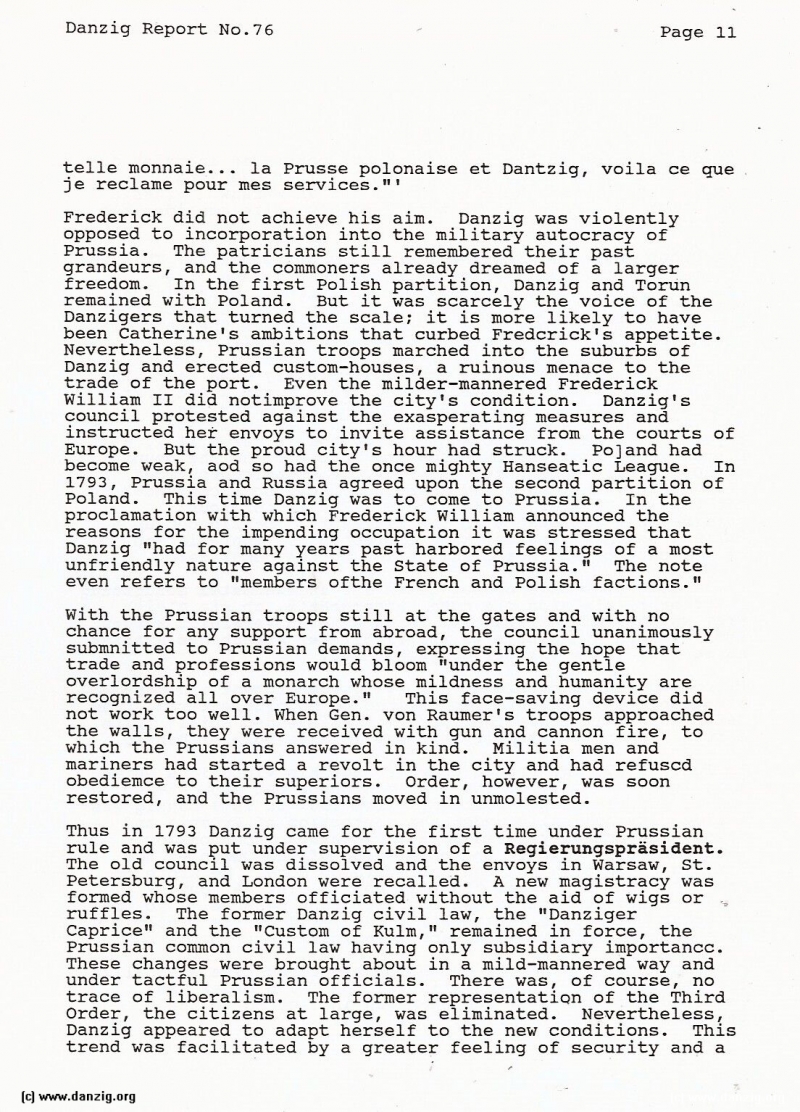
telle inonnaie... la Prusse polonaise et Dantzig, voila ce gue je reclaine pour xnes services.”’
Frederick did not achieve his aim. Danzig was violently opposed to incorporation into the military autocracy of Prussia. The patricians still remembered their past grandeurs, and the commoners already dreamed of a larger freedom. In the first Polish partition, Danzig and Torun remained with Poland. But it was scarcely the voice of the Danzigers that turned the scale; it is more likely to have been Catherine’s ambitions that curbed Fredcrick’s appetite. Nevertheless, Prussian troops marched into the suburbs of Danzig and erected custom—houses, a ruinous menace to the trade of the port. Even the milder—mannered Frederick William II did notimprove the city’s condition. Danzig’s council protested against the exasperating measures and instructed her envoys to invite assistance from the courts of Europe. But the proud city’s hour had struck. Po) and had become weak, aod so had the once mighty Hanseatic League. In 1793, Prussia and Russia agreed upon the second partition of Poland. This time Danzig was to come to Prussia. In the proclamation with which Frederick William announced the reasons for the impending occupation it was stressed that Danzig “had for many years past harbored feelings of a most unfriendly nature against the State of Prussia.” The note even refers to “members ofthe French and Polish factions.”
With the Prussian troops still at the gates and with no chance for any support from abroad, the council unanimously subnmnitted to Prussian demands, expressing the hope that trade and professions would bloom “under the gentle overlordship of a monarch whose mildness and humanity are recognized all over Europe.” This face—saving device did not work too well. When Gen. von Raumer’s troops approached the walls, they were received with gun and cannon fire, to which the Prussians answered in kind. Militia men and mariners had started a revolt in the city and had refuscd obediemnce to their superiors. Order, however, was soon restored, and the Prussians moved in unmolested.
Thus in 1793 Danzig came for the first time under Prussian rule and was put under supervision of a Regierungspräsident. The old council was dissolved and the envoys in Warsaw, St. Petersburg, and London were recalled. A new magistracy was formed whose members officiated without the aid of wigs or ruffles. The former Danzig civil law, the “Danziger Caprice” and the “Custom of Kulm,” remained in force, the Prussian common civil law having only subsidiary importancc. These changes were brought about in a mild—mannered way and under tactful Prussian officials. There was, of course, no trace of liberalism. The former representatiQn of the Third Order, the citizens at large, was eliminated. Nevertheless, Danzig appeared to adapt herself to the new conditions. This trend was facilitated by a greater feeling of security and a
Danzig Report Vol. 1 - Nr. 76 - July - August - September - 1992, Page 11.
Hits: 3444
Added: 02/07/2015
Copyright: 2025 Danzig.org

